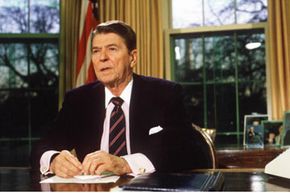Will the American Dream survive in the 21st century?
In 1980, Americans' concern about the dream's decline helped elect a U.S. President, Ronald Reagan, who promised to restore it. Reagan himself was an embodiment of the dream; the son of a humble farm family in Illinois, he'd risen to become a Hollywood movie star, a spokesman for General Electric and California governor. Reagan proclaimed that America was still a place where "everyone can rise as high and far as his ability will take him" [source: PBS].
Reagan's formula for restoring the American dream was to cut taxes, which he argued would stimulate economic growth. He also aimed to reduce government social programs, which he believed discouraged self-reliance . The economy eventually did revive, and growing prosperity helped Reagan easily win reelection in 1984. But critics also pointed to ballooning government deficits, and questioned whether cutting taxes really would revive the dream for most Americans, or only for the privileged few [source: PBS].
Advertisement
Congressional Budget Office data supports their case. Between 1979 and 2005, the income of the bottom 99 percent of U.S. households grew 21 percent after taxes, a rate of less than one percent a year, not enough to keep up with inflation. But during that same period, the after-tax income of the richest one percent of Americans grew by 225 percent. In 1979, the richest one percent made eight times as much as the typical middle-class family. In 2005, the richest made 21 times as much as the middle-class [source: Bernstein].
Nevertheless, the debate about how to revive the American dream has continued. Conservatives call for cutting taxes, while liberals argue for raising taxes on the wealthy to pay for programs to help lift up the rest.
Meanwhile, a third group argues that the pain needs to be spread evenly, and that Americans need to rethink what the American dream really means. In a 2008 essay, Harvard professor John Quelch admonishes that "too many Americans have been expressing the Dream through the acquisition of stuff." He urges them to see the dream as the freedom to pursue one's career ambitions, to educate our children, and most importantly, to be good citizens in our communities. That, in a sense, is a return to James Truslow Adams' 1931 definition of the American Dream as "a social order in which each man and each woman shall be able to attain the fullest stature to which they are innately capable, and be recognized by others for what they are, regardless of the fortuitous circumstances of birth or position" [source: Quelch].
Related Articles
- 10 of the Biggest Lies in History
- The Ultimate Citizenship Quiz
- How Immigration Works
- How the Census Works
- How Capitalism Works
- How Passports Work
- How the Civil Rights Movement Worked
- How Trickle-Down Economics Works
- How Social Security Numbers Work
- Does democracy work?
- Is a free market "free" if it's regulated?
- How can I erase my identity and start over?
More Great Links
- Center for a New American Dream
- Forbes.com Special Report: The American Dream
- Library of Congress: What is the American Dream?
Sources
- Adams, James Truslow. "The Epic of America." Atlantic Monthly Press Books. 1931. (April 22, 2011)http://books.google.com/books?id=-VMVAAAAIAAJ&printsec=frontcover&dq=james+truslow+adams+the+epic+of+america&source=bl&ots=ISmLb1-TnT&sig=4BDPoYNe2W9VrVJH4YCSN2Ce130&hl=en&ei=idaxTbKSOo--tgelsajnCw&sa=X&oi=book_result&ct=result&resnum=4&ved=0CD0Q6AEwAw#v=onepage&q&f=false
- Anderson, Sherwood. "Windy McPherson's Son." John Lane Co. 1916. (April 22, 2011)http://books.google.com/books?id=stonAQAAIAAJ&pg=PA258&dq=%22The+American+Dream%22&hl=en&ei=de2xTabzEIL30gGRqID1CA&sa=X&oi=book_result&ct=result&resnum=6&ved=0CFAQ6AEwBTgK#v=onepage&q=%22The%20American%20Dream%22&f=false
- Bernstein, Jared. "Updated CBO data reveal unprecedented increase in inequality." EPI.org. Dec. 13, 2007. (April 22, 2011) http://www.epi.org/publications/entry/ib239/
- Carlin, George. "Life is Worth Losing." (Video excerpt.) 2005. (April 22, 2011)http://www.youtube.com/watch?v=acLW1vFO-2Q&feature=player_embedded
- Cullen, James. "The American Dream: A short history of an idea that shaped a nation." Oxford University Press. 2003. (April 22, 2011)http://books.google.com/books?id=yM96DK4ELZkC&printsec=frontcover#v=onepage&q&f=false
- Ewalt, David M. and Noer, Michael. "Special Report: The American Dream." Forbes.com. March 22, 2007. (April 22, 2011)http://www.forbes.com/2007/03/20/american-dream-oped-cx_de_dream0307_0322dream_land_print.html
- Ferentz, Kathleen and Donlan, Leni. "The American Dream: Lesson Overview." Library of Congress. 1997. (April 22, 2011)http://www.loc.gov/teachers/classroommaterials/lessons/american-dream/
- Ford, Richard. "Revolutionary Road." The New York Times. April 9, 2000. (April 22, 2011)http://www.nytimes.com/2000/04/09/books/essay-american-beauty-circa-1955.html?pagewanted=all&src=pm
- Freudenheim, Betty. "Author Carlander Claims American Dream is Dead." Sarasota Herald-Tribune. June 20, 1974. (April 22,2011)http://news.google.com/newspapers?id=PQEkAAAAIBAJ&sjid=5WYEAAAAIBAJ&pg=3694,2183664&dq=american+dream+dead&hl=en
- Hartman, Christopher. "Herbert Hoover: The 31th President, 1929-1933." Christian Science Monitor. (April 22, 2011)http://www.csmonitor.com/Books/Book-Reviews/2009/0226/herbert-hoover-the-31st-president-1929-1933
- Jefferson, Thomas. "The Declaration of Independence." USHistory.org. 2011. (April 22, 2011)http://www.ushistory.org/declaration/document/
- King, Dr. Martin Luther, Jr. "The American Dream." Speech given at Drew University, Madison, NJ. Feb. 5, 1964. (April 22, 2011)http://depts.drew.edu/lib/archives/online_exhibits/King/speech/TheAmericanDream.pdf
- "Legacy: Ronald Reagan, 40th President." PBS.org. (April 22, 2011)http://www.pbs.org/wgbh/amex/presidents/40_reagan/reagan_legacy.html
- "The Mendacity Index." Washington Monthly. September 2003. (April 22, 2011)http://www.washingtonmonthly.com/features/2003/0309.mendacity-index.html
- Millett, Ruth. "A kind word for suburbia-new target for 'experts.'" Rock Hill, SC Herald. Nov. 23, 1960. (April 22, 2011)http://news.google.com/newspapers?id=QsMtAAAAIBAJ&sjid=6J4FAAAAIBAJ&pg=960,3827511&dq=what+is+the+american+dream&hl=en
- Quelch, John. "Selling Out The American Dream." Harvard Business School. Nov. 6, 2008. (April 22, 2011)http://hbswk.hbs.edu/item/6071.html
- Roosevelt, Franklin D. "The Four Freedoms." Speech to Congress. Jan. 6, 1941. (April 22, 2011) http://www.americanrhetoric.com/speeches/fdrthefourfreedoms.htm
- Schultz, Stanley K. and Tishler, William P. "The 1950s: The Cold War and the Affluent Society." Lecture. University of Wisconsin. 1999. (April 22, 2011)http://us.history.wisc.edu/hist102/lectures/lecture24.html
- Thoreau, Henry David. "Walden." Thoreau.eserver.org. 1854. (April 22, 2011)http://thoreau.eserver.org/walden00.html
- Wilson, Sloan. "The Man in the Gray Flannel Suit." Four Walls Eight Windows Press. 2002. (April 22, 2011)http://books.google.com/books?id=5gE_LKi6BE4C&printsec=frontcover&dq=the+man+in+the+gray+flannel+suit&hl=en&src=bmrr&ei=BAuyTaWNNefg0QGUpsn7BQ&sa=X&oi=book_result&ct=result&resnum=1&ved=0CEkQ6AEwAA#v=onepage&q&f=false
- Winthrop, John. "A Modell of Christian Charity." Hanover Historical Texts Project. August 1996. (April 22, 2011)http://history.hanover.edu/texts/winthmod.html
- Zakaria, Fareed. "How to Restore the American Dream." Time. Oct. 21, 2010. (April 22, 2011)http://www.time.com/time/printout/0,8816,2026776,00.html
